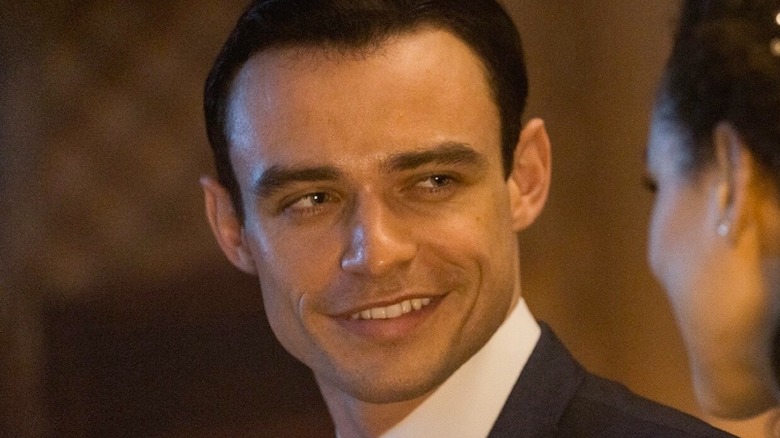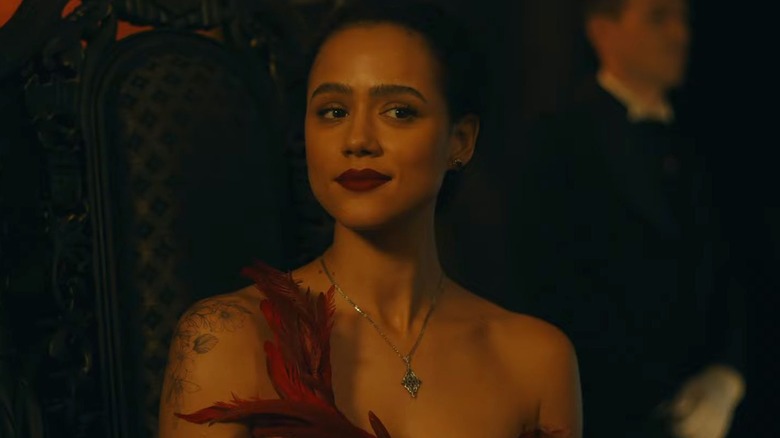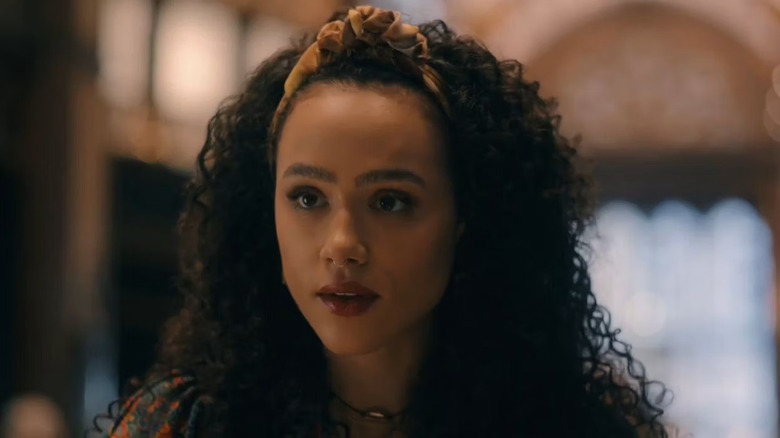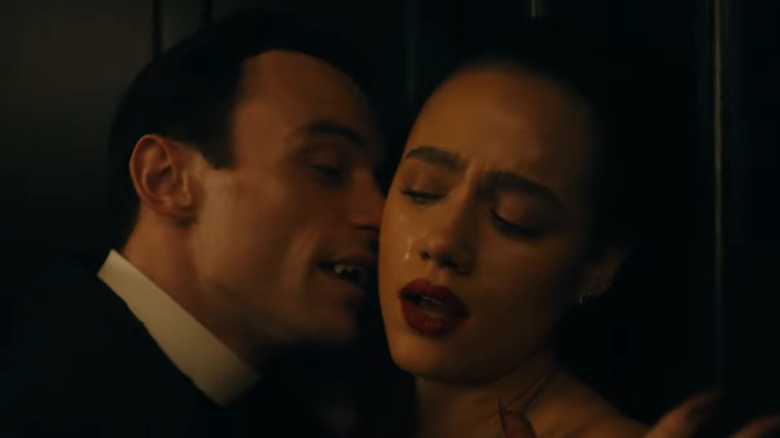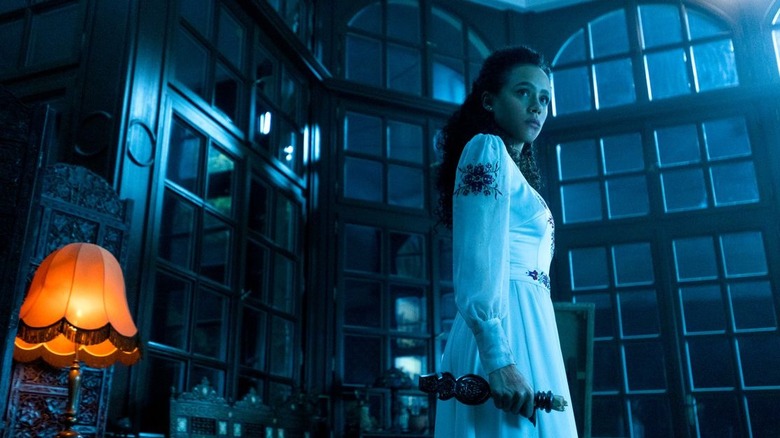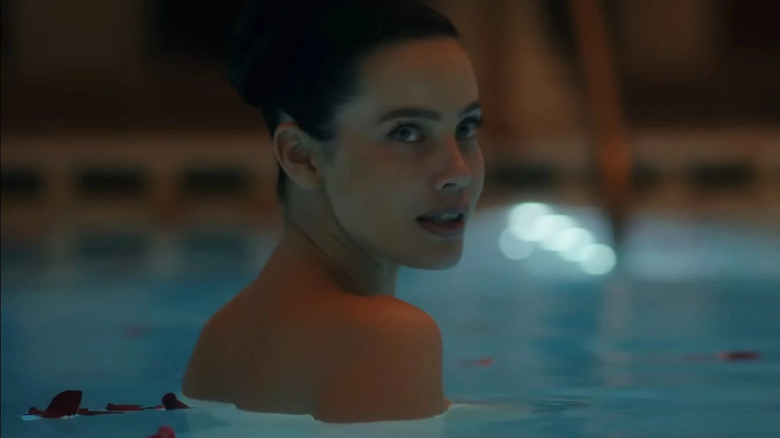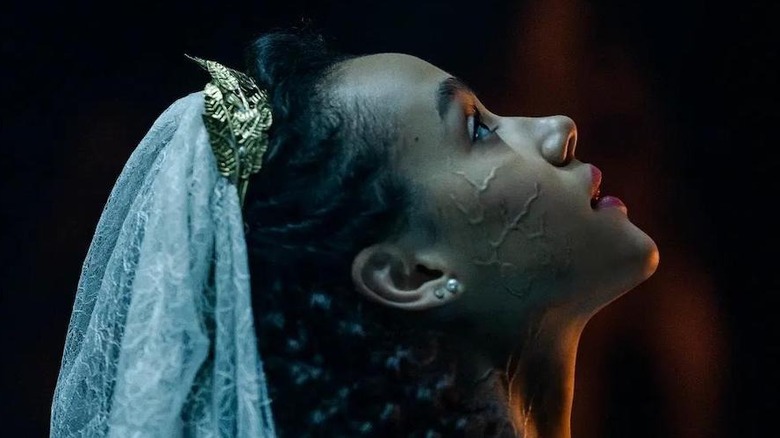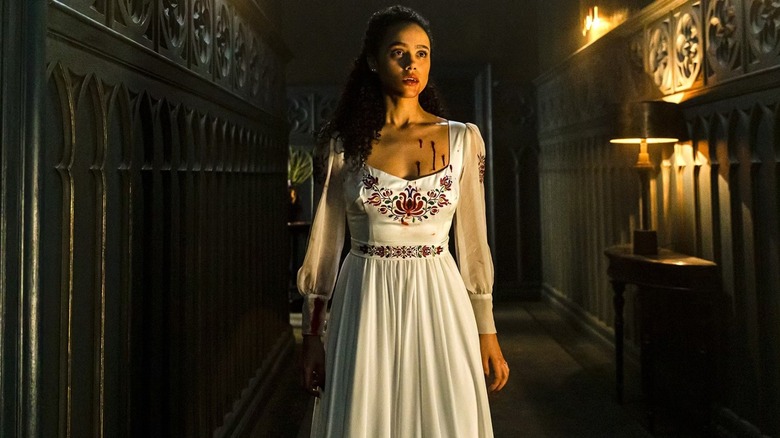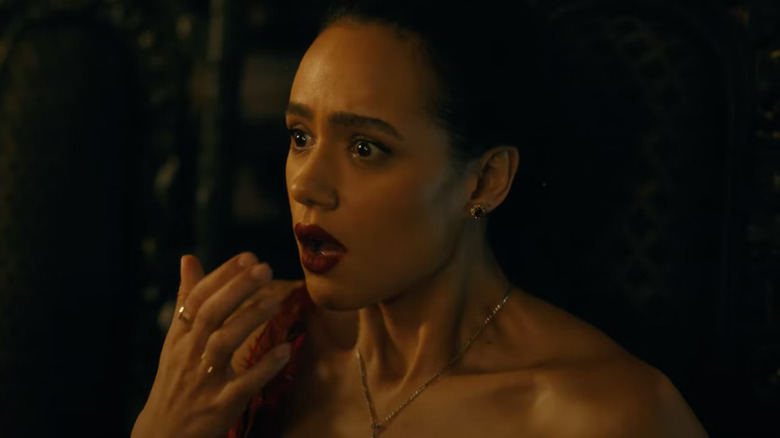The Ending Of The Invitation (2022) Explained
If there is one unchanging, universal constant when it comes to the movies, it's that there will always be another vampire movie — which for fans of the bewitching bloodsuckers, is always good news. Like other immortal (or should we say undead) archetypical monsters like zombies, werewolves, ghosts, and demons, vampires find themselves rehashed, reinvented constantly. The latest film to showcase these fanged fiends is "The Invitation," a true horror movie at its core, but one that blends in dark humor and romance to give its bump in the night its own unique tone. Despite the way in which "The Invitation" deliberately wears its many influences on its sleeve, it still ends on a distinctive note, a note that is worth explaining.
The best part of "The Invitation" isn't in its plot — as boilerplate and predictable a plot as there ever was — but in the way in which director Jessica M. Thompson sprinkles in a few coffins-full of moments that subtly symbolize and build its world. From Biblical references to altered histories to a wider world of bogeymen, Thompson ensures that the "The Invitation" has more up its ornate, Victorian sleeves than you might catch at first glance. To help reveal some of the invisible, here is the ending of "The Invitation" explained.
The Dragon
The major twist in "The Invitation" is a two-parter. First, main character Evelyn Jackson's (Nathalie Emmanuel) new rich, handsome beau, Walter (Thomas Doherty), is actually a vampire, and second, that the wedding she was invited to is her own — she's to become the vampire's bride. Neither twist is surprising in the least, and the movie telegraphs them over and again, but the one facet of the twists that is handled subtly and invokes explanation is the vampire's true identity: Not only is Walter almost certainly the Dracula, he may very well be the literal son of the devil.
Thompson seeds clues throughout the movie that hint at Walter's infernal heritage, ranging from sly to blatant. The most blatant by far is Walter's surname, De Ville, as is one the nicknames which he reveals that ancient peoples have called him: "Son of the Dragon." In the history of Western cultures, one of the earliest, and by far the most famous, dragons was the Great Red Dragon, Satan. Another clue is Walter's insistence on only killing and eating his prey starting at 3:00 a.m., the hour commonly referred as either the Witching Hour or the devil's hour.
A third nail in the (ahem) coffin comes when the vampire Viktoria (Stephanie Corneliussen) reveals that Walter has been around for "thousand of years," placing his birth/undeath farther back than the stereotypical Middle Age Vlad the Impaler, all the way to Biblical times.
Evie and Eve
Walter De Ville, the probable son of Satan, is not the only Biblical reference in "The Invitation" — far from it. And among the many biblical symbols and allusions to biblical events, the most prevalent is the main character, Evelyn Jackson — aka Evie. Like Walter's surname De Ville, Evie's name is a clear reference to a major character in the Bible, in this case Eve.
Not only is Evie's name suggestive, but much of the movie around her suggests that she is the modern-day Eve. Her room at the De Ville manor is painted from floor to ceiling with a garden mural. The scene is her room is wall-to-wall grass, trees, and birds — you might even call it Edenic. On several of the painted tree branches, large, shiny, red fruit hang, adding to the allusion, and shortly after Evie arrives, the connection is even said aloud. As Walter leads Evie on a tour of his actual garden, the pair pause at a statue of Eve herself, debating whether or not to eat the forbidden fruit, and with a serpentine Satan coiling around her. Considering the statue, Evie jokes — not knowing how prophetic her words would be — "Knowledge or nudity, Eve. What's it gonna be?"
A global cabal
The biggest change that "The Invitation" made to established vampire lore lies in how far Dracula's social influence extends, and because of that, how dependent on human aid he has become. Walter has been alive for thousands of years and been known by titles such as "Son of the Dragon," "Nosferatu," and even "Strigoi": an ancient Greek term that proves Walter's ancient origin (and may remind some fans of its variant spelling, Striga, which appeared as a similar undead monster in Netflix's "The Witcher"). The movie makes it very clear that the reason for Walter's extreme longevity is not just his supernatural powers but also a multinational network of rich and powerful humans that take care of his every need.
As Evie learns shortly before Walter captures her and gives her the "Psych! I'm Dracula" speech, three powerful human dynasties have been in his service for hundreds, perhaps thousands of years. Together, they work to supply him with a steady stream of fresh, young victims — which at least during the movie, were brought to his estate under the pretense of being maids and caterers — as well as with his wives. Each of the families elects their most promising young woman to become the latest bride of Dracula, which is why the Alexanders were so delighted to track down their long-lost cousin Evie and offer her up on a (anything but silver) platter.
More monsters?
"The Invitation" is a pretty straightforward vampire movie, and for the vast majority of its runtime doesn't spend its energy seeding its world with other creatures. Its lore is more simplistic, even, than a movie like "Day Shift," which at least broke down its vampires into distinct casts with their own unique biological traits. But "The Invitation" does take just a handful of quick shots and snippets of dialogue to hint that vampires might not be the only threat to humans in this world.
The entire reason that Walter's human servants enticed Evie to the De Ville estate, kicking off the movie, is that the last bride of Dracula to come from Evie's family, Emmaline, recently ended her undead life, finally too agonized by killing so many innocent humans. Yet multiple shots of the movie show Emmaline, clad in all white, watching Evie through the windows of the estate's buildings, making either a metaphorical, emotional ghost or a very literal one.
The other potential creatures that lurk within the estate are, as contradictory as it may seem, werewolves. At multiple points, wolves can be heard howling in the night, and Walter's butler even says aloud, when threatening Evie, that he will feed her "to the wolves." Those facts become especially curious when Evie asks Walt if there are any wolves in England, to which he laughs and tells her that there haven't been any wolves in England for 400 years.
St. George
The biggest recurring symbolism in "The Invitation" is its various biblical allusions, and among them, the most glaring by far is its frequent depictions of and allusions to St. George, a real, historical figure whose alleged deeds became almost entirely mythical. By far, the most famous among those deeds was when he slayed a great human-eating dragon.
The son of the Dragon himself, Walter, makes a large statue of St. George battling the dragon the centerpiece of his entry room. The statue's size and dynamism ensure that it dominates the room and draws all eyes, including Evie's and movie-goers, to it. It also demands attention because of the exact nature of the battle it depicts — Walter's statue shows an alternate history, one in which the dragon defeats St. George. The symbolism there is clear, that in this world (or at least in Walter's ego), the dragons win the war against humanity, and the same is true for the Great Red Dragon Satan and the son of the Dragon, Walter.
The statue shows St. George on his back, reaching desperately for his legendary lance, which lays next to him, sticking out into the room, and though it is meant to celebrate Walter's (or his family's) success, it ends up playing a major role in their undoing. Walter's two wives, Viktoria and Lucy, end up impaled on St. George's lance just before the film ends, proving the original story true once more — St. George's lance does indeed slay dragons.
Blood is thicker than Walter
The ending of "The Invitation" has a predictable amount of blood in it, both for a standard horror movie and accounting for its vampire-centric nature. What is less predictable, however, is the many odd ways in which blood comes into play — it does a lot more than just flow into Walter's fangs. It also sets up the movie's larger world and teases Evie's true specialness in more ways than one.
Probably the biggest bombshell dropped in "The Invitation" is that Walter needs brides from three distinct bloodlines to survive. He doesn't just benefit from their resources and assistance in finding prey, he actually requires a bride from each bloodline at all times, or else his power will fade. Sadly, after this major plot point is revealed, it is barely mentioned again, but it does tease something greater in the setting — either these bloodlines have some magical components in them that together create a magical cocktail, or they have unique biological mutations that do the same.
The possible implications are myriad and in a different movie, could have produced a truly unique vampire story. But blood does affect "The Invitation" in other ways, like when Evie drinks Walter's blood to sap his powers and kill him and his followers. After drinking his blood, Evie is called a "half-breed" by other vampires, referring both for her mixed English/African-English heritage and her demi-vampire status (as she would have to let Walter drink her blood after she drank his in order to become a true vampire).
Where do the characters go from here?
At the close of "The Invitation," the status quo for all of its major characters is completely inverted, leaving some with no destiny and some with more hope than ever. Some characters, like Walter, his brides Viktoria and Lucy, his butler Mr. Field, his maid Mrs. Swift, Emmaline, and four out of five maids-for-hire, have absolutely no where to go — they're all either murdered, eaten, staked, hung, or burned to ashes. Others, however, have interesting roads ahead.
Dea, the only maid-for-hire to survive without becoming Walter-food, is freed by Evie, who implores her to run from the manor and get help. Hopefully, she is successful and manages to alert the authorities to the evil that takes place at De Ville manor, but that is doubtful. After all, when Evie flees the manor herself earlier in the film, also seeking help, she finds out that Walter and three families' power reaches far beyond their own grounds.
Evie and her best friend Grace star in the movie's final scene, having tracked down Evie's cousin Oliver — the same Oliver who tracked Evie down and served her up to Walter — now prepared to exact their revenge with a baseball bat. As for the rest of the three families, their wealth and power are sure to keep them living comfortably, at least until Evie and Grace introduce them to the bat.
An undead franchise
Like any film, one of the first questions fans of "The Invitation" will ask is whether or not a sequel is in the works. That inevitably relies on many factors, but generally speaking, the largest factor is its box office performance. Made with an approximate $10 million budget, "The Invitation" has (at the time of this writing) only grossed a bit more than that sum, suggesting that it may break even, but is unlikely to be considered a success by any company who helped pay for it. That puts the likelihood of a sequel low, barring any unforeseen spikes in ticket sales or fan interest.
In addition, the main plot of the movie wrapped itself up with a neat little bow, which further makes a sequel unlikely. Although the film hinted at a wider world of possible specters and spooks, none of them played a major enough role to warrant further stories. However, even if "The Invitation" never receives a sequel, fans may still have another movie to look forward to.
As Thompson told Slash Film, "We are releasing the R version online later." She promised that "There's more gore, there's more blood in the R version. There is more swearing, and there is the sex scene is five times longer." She even suggested that, depending on how the movie is re-cut, it could become more of a horror comedy. The re-cut and re-release mean that, for fans of "The Invitation," its ending is not the end.
